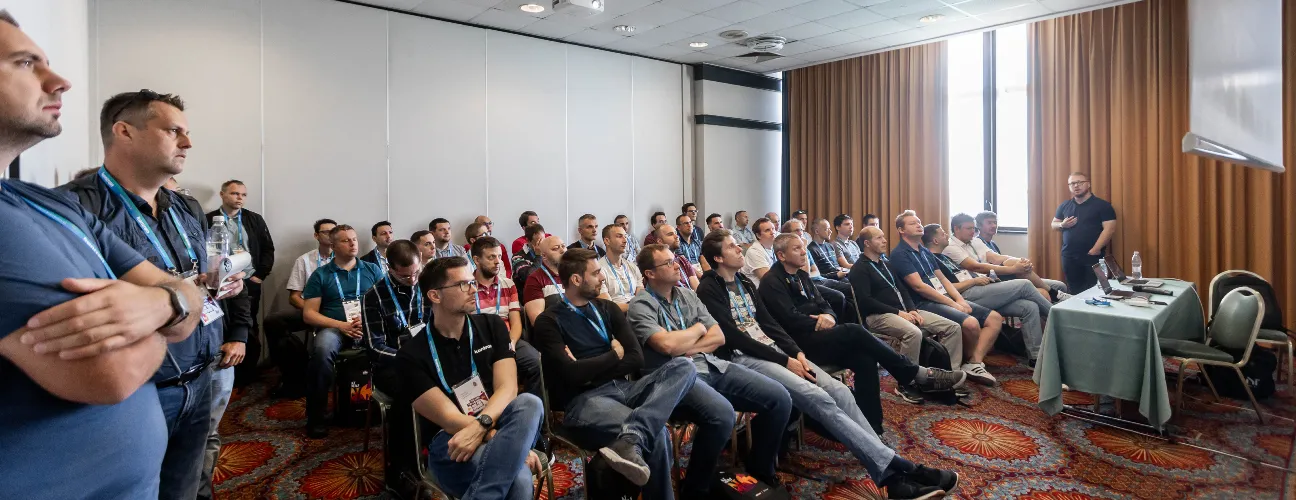How to Land a Speaking Gig at a [good] Event
May 5, 2025 • 4 min read • By Adis Jugo, CEO

![How to Land a Speaking Gig at a [good] Event](/images/content/cb893947-bccc-437e-ba03-af16f5d70dfc-1.webp)
How to Land a Speaking Gig at a Good Event
It’s that time of the year again when conference organizers worldwide are sorting through hundreds, sometimes thousands of session submissions for their upcoming events. As part of numerous content teams over the years, I’ve witnessed firsthand how challenging it can be to select only a fraction of submitted sessions - often as few as one in ten make the final cut.
This means that many experienced and talented speakers get rejected or placed on waiting lists. At the same time, seemingly “unknown” speakers sometimes land coveted speaking slots.
Why is that so?
Having been on both sides of this process, I’d like to share some insights that might help anyone looking to secure a speaking opportunity at a conference. These guidelines reflect the common selection criteria used by content teams worldwide.
Content is King!
This is the golden rule that embraces all others. It really doesn’t matter what your name is, where you come from, or if you’re considered a “rock star” in your field. The primary decision criterion is based on the content you’ve submitted.
If your topic fits the conference profile and addresses common use cases and problems, it’s likely to be accepted. Think carefully about your sessions; read your abstract multiple times before submitting it. There’s no “previous year’s speaker” bonus - no one gets a session simply because they spoke at the event before.
Content teams care about one thing: quality content. You’ll often see relatively unknown speakers at major conferences because their content was compelling and valuable.
Don’t Jump on the Bandwagon!
Avoid hopping from one “hot topic” to another. That approach isn’t effective or respected. Don’t simply “choose topics to speak about” based on what’s trending. Submit what you’re genuinely good at.
If you submit yet another session on the latest trendy technology, be aware that there are probably already dozens of similar submissions, and the content team will select the one from someone who demonstrates genuine expertise. If it’s your core topic and you have something valuable to share, by all means, submit it! But don’t submit it merely because it’s currently popular.
Similarly, don’t submit a niche topic just because you think nobody else will and your chances might increase. That topic is niche for a reason - it probably doesn’t interest many attendees (something organizers and content teams care deeply about). Again, if you’re truly knowledgeable about it and believe it’s important, submit it by all means! But don’t submit it just because you think an exotic topic will secure you a spot.
Don’t Submit Only One Session!
There’s a good chance your single submission might not fit the conference concept. Submit two or three sessions in areas where you genuinely excel and are recognized as an expert.
Don’t Submit Too Many Sessions!
Would you trust a doctor who claims to have deep expertise as an orthopedist, cardiologist, anesthesiologist, dermatologist, and neurologist simultaneously? Content teams carefully review all submitted sessions and become suspicious of people submitting numerous proposals across vastly different areas.
If It’s Not a Poetry Conference, Don’t Be a Poet!
Content teams frequently encounter session abstracts they have to read multiple times and still can’t understand. While you can use engaging language in your session title, please use the abstract to clearly communicate what you intend to discuss.
Avoid excessive buzzwords - they don’t help your cause. If the content team is confused by your abstract, imagine how confused attendees will be. I’ve witnessed content teams reading abstracts aloud multiple times and still being unable to determine what the session was about. Needless to say, those submissions were rejected.
Don’t Push Too Much with Redeliveries!
Content team members closely monitor similar events and often speak at them themselves. In many cases, they know you personally. If they’ve seen the same session too many times, they’re unlikely to select it.
Redelivering content in different cities, timeframes, or contexts is perfectly acceptable. We all understand how much effort goes into preparing a quality session. However, submitting the identical session to the same event multiple years in a row rarely works. The argument that “things have changed in the meantime” typically doesn’t help your case either.
Use the System, Respect the Timeframe
Don’t send session abstracts via social media messages or personal emails. That’s unprofessional and shows disrespect for the content team’s process. Use the submission system built for the event (preferably run.events ) - it makes the job of the content team significantly easier.
Having personal connections with content team members doesn’t entitle you to bypass established submission channels. Doing so demonstrates a lack of respect for their time and effort.
Deadlines exist for a reason. Content teams begin evaluating submissions immediately after the deadline passes. The final selection day is just the culmination of a process that starts much earlier. Not respecting deadlines shows disregard for the content team’s work.
Don’t Contact the Content Team
For whatever reason you might have, avoid contacting content team members to “ask about your status,” “explain what your session is about,” or “offer alternative sessions if your submissions don’t fit.” Such actions often work against you. If your sessions are rejected, this behavior might be partly responsible. If they’re accepted, it certainly wasn’t because you asked, and your actions leave a negative impression.
Be Flexible
Content team members might ask you to modify your session slightly within its - and your - core topic. This could be to differentiate it from similar sessions or to emphasize aspects they feel deserve more attention. If you can accommodate these requests, please do so - you’ll make the content team happy. If you cannot, please decline rather than promising to “learn it in the meantime,” which rarely ends well.
Build Your Speaking Portfolio
A great way to increase your chances of being selected is to build and maintain a proper session portfolio. run.events allows you to create a speaking portfolio and to publish it on an easily accessible link. Put all your sessions that you’re currently capable of delivering there, using the rules I mentioned above. Don’t worry about showing “too much” - this is exactly where you want to showcase your expertise spectrum.
If organizers are using run.events for the content selection process, they will be able to see your portfolio automatically. If organizers are using any other content selection system, include that link together with your session submissions. Don’t just hope they will find your sessions somewhere online - make it easy for them to see your complete offering.
This way organizers will be aware of your experience and your areas of proficiency, and might be compelled to ask you to deliver one of the sessions from your portfolio if it better fits the event’s profile. I’ve seen this happen numerous times - a speaker wasn’t selected for their submitted sessions, but ended up speaking because the content team discovered a perfect fit in other topics.
The Ultimate Rule
At the end of the day, there’s only one rule that supersedes all others: submit only topics you’re genuinely good at.
Audiences inevitably recognize competence (or lack thereof). This is how you build your personal reputation and contribute to the conference’s standing.
If you’re concerned that the topics you excel in might not be accepted, submit them anyway. You might want to reflect on how relevant your knowledge is to your industry currently (or whether it will be relevant soon). If you feel it isn’t, that’s not a reason to submit topics outside your areas of expertise.
For those who receive rejection notices, please understand that conference selection is highly competitive. At major events, only a small percentage of submissions can be accepted. There’s simply no way to accommodate everyone, regardless of how qualified they may be.
Remember these guidelines, and I look forward to seeing you on stage at the next great industry event!



